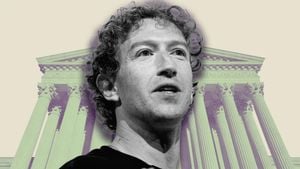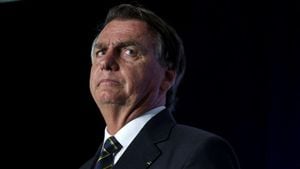Australia is taking bold steps to reshape the social media environment for its younger population with proposed legislation aimed at banning access to most platforms for those under the age of 16. This initiative, currently under consideration by the Australian government, has sparked significant debate both domestically and internationally, raising questions about its feasibility and potential socio-legal ramifications.
The proposed law targets popular social media platforms like X (formerly Twitter), Facebook, Instagram, Snapchat, and TikTok, effectively prohibiting users under 16 from creating or maintaining accounts. To enforce compliance, the government is eyeing advanced age-verification systems, which could involve the use of biometrics or government-issued identification. There's also talk of hefty fines—up to AUD 50 million (approximately USD 45.4 million)—for companies failing to adequately prevent underage users from accessing their platforms.
Prime Minister Anthony Albanese launched this initiative with the firm belief it sends a strong message to social media companies, urging them to take responsibility for their platforms. "This is a landmark reform. We know some kids will find workarounds, but we’re sending a message to social media companies to clean up their act," Albanese stated.
Despite the apparent intention behind the initiative, experts have expressed skepticism about its practicality. James Turk, director of the Centre for Free Expression at Toronto Metropolitan University, voiced his concerns, stating, "A blanket ban may not be the best course." He emphasized the complexity of the issues at hand, likening the potential impact of such regulations to attempts to control what materials children can access at libraries. "We really don’t want the digital platforms to be the bodies deciding what kids can see—parents should take on this responsibility, not the government or corporations," he added.
Are age restrictions enough to safeguard children from the myriad dangers present on social media platforms? Critics point to the inherent tech-savviness of children today, who may easily circumvent these restrictions. Jason Hannan, professor of communications at the University of Winnipeg, argues such paternalistic approaches are misguided. "The idea some form of paternalistic control will make the slightest bit of difference is extremely misguided," he remarked, advocating instead for investing resources in education and digital media literacy from early childhood.
Across the globe, the stance taken by Australia is garnering attention, particularly as the UK has hinted at considering similar measures. The UK’s Secretary of State for Digital, Culture, Media and Sport, Peter Kyle, has publicly stated the necessity of safeguarding children online and pledged to examine the impact social media has on youth thoroughly.
Meanwhile, Canada's own plans for regulation include the proposed Online Harms Act, which aims to establish protections for children online. This act does not pursue outright bans like those proposed in Australia but emphasizes the requirement for technology platforms to take preventive measures against harmful content, including mandatory reporting of child sexual abuse material.
Elon Musk, the owner of X and notable advocate of free speech, has criticized Australia's proposed legislation, labeling it as "a backdoor way to control access to the Internet by all Australians." Musk's comments are part of his broader resistance against what he perceives as excessive regulation of online platforms. He has clashed with Australian authorities before, having previously characterized their tech regulations as "fascist." This latest jab adds another layer to the complex dialogue surrounding online governance.
The stakes of this law reach far beyond Australia, as governments globally grapple with the balance between protecting children and the broader implications of such restrictions on freedom and access. While proponents of the ban argue it is necessary for the safety and well-being of children, opponents contend it may establish precedents for government control over digital spaces, potentially infringing on personal freedoms.
Commentators anticipate challenges surrounding implementation, not least the reality of policing age restrictions on social media—especially platforms with billions of active users and varied global reach. Could this mean social media giants have to navigate the murky waters of regulatory compliance across different jurisdictions, each with its unique rules and standards?
The ultimate effectiveness of the proposed bill will depend significantly on public reception, compliance by social media platforms, and, perhaps most intriguingly, how younger users themselves respond to such restrictions. Could this trigger new forms of social interaction or even decentralized platforms rising to popularity among youth?
Through the lens of Australia's proposed social media ban for those under 16, the discourse on digital accountability, youth protection, and inherent rights takes on new urgency and complexity. Navigators of this rapidly changing digital world must remain vigilant, as the outcomes of this policy might spearhead broader international dialogues on the governance of online behavior and ethics.



